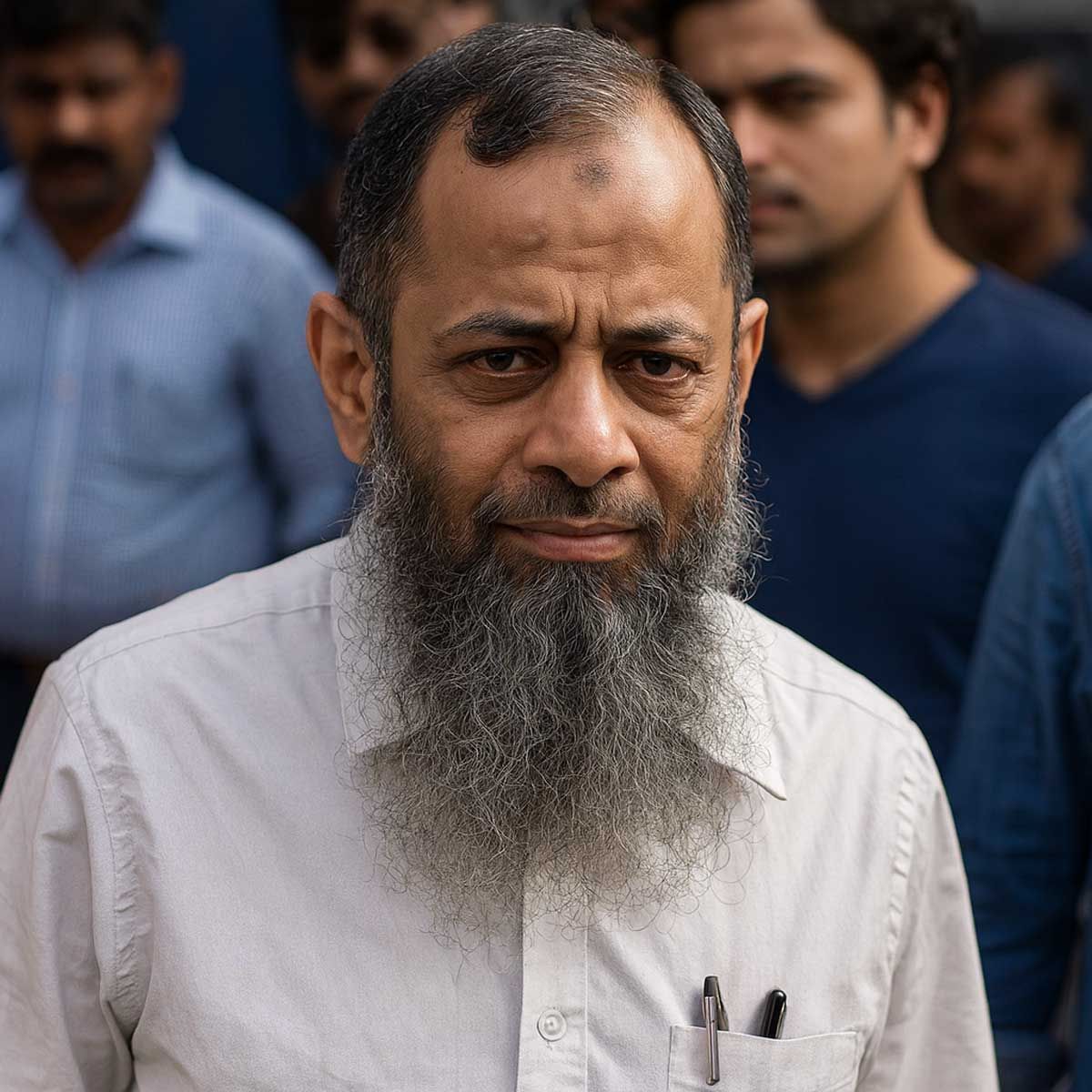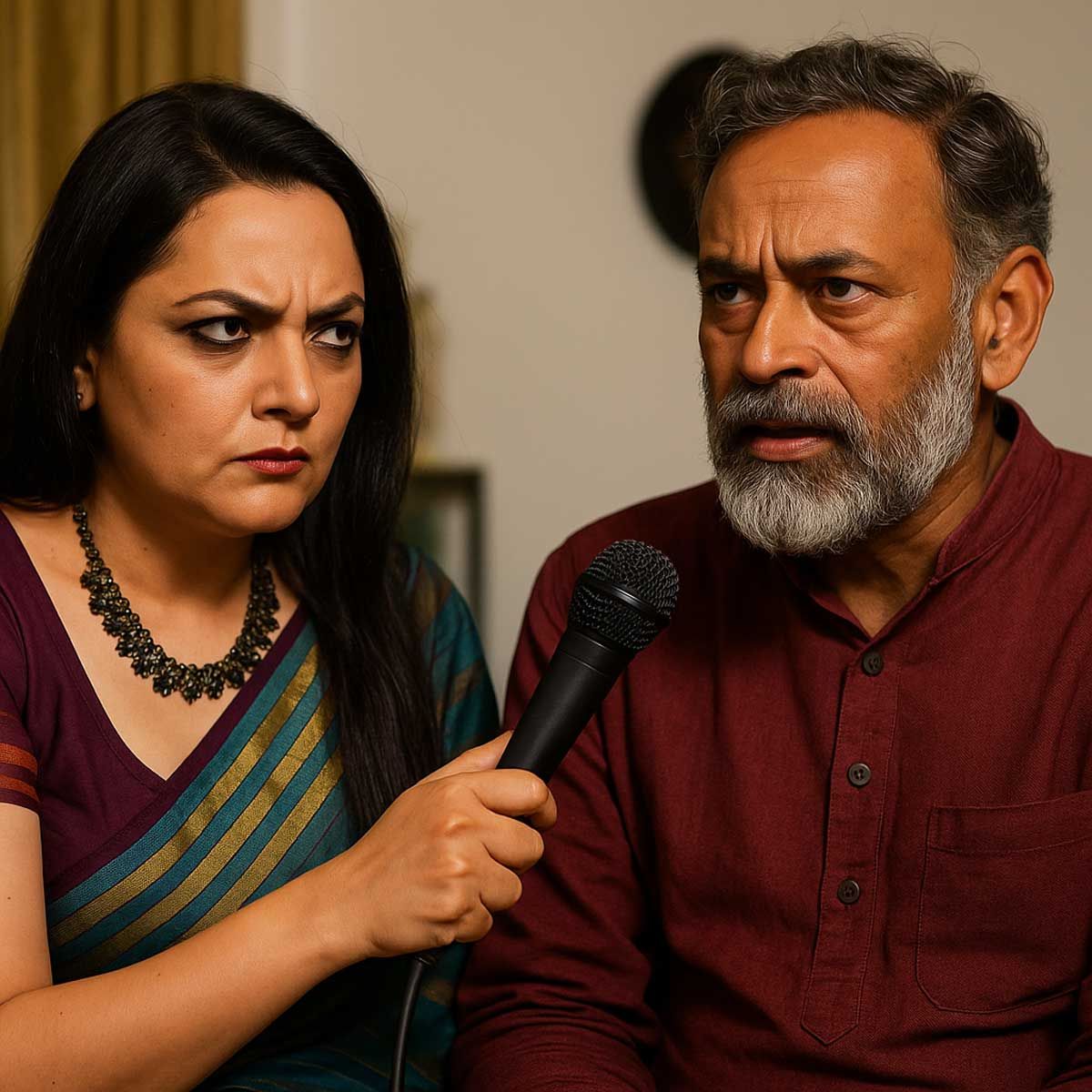More Coverage
Twitter Coverage
Satyaagrah
Written on
Satyaagrah
Written on
Satyaagrah
Written on
Satyaagrah
Written on
Satyaagrah
Written on
JOIN SATYAAGRAH SOCIAL MEDIA
Supreme Court crushed Saquib Nachan’s attempt to whitewash ISIS by claiming ‘Caliphate’ and ‘Jihad’ had no terror link, exposing his role in the Mumbai blasts, turning Padgha into a jihadi base, and son Shamil’s IED plot in Pune—terror ran in their blood

On Tuesday, 5th August, the Supreme Court of India delivered a firm dismissal of a plea filed by deceased terror-accusedSaquib Nachan, who had challenged two government notifications that officially declared ISIS and its related groups as terrorist organisations under the Unlawful Activities (Prevention) Act (UAPA), 1967. Nachan had submitted the petition in December 2024, but he passed away in June 2025 due to a brain hemorrhage. Despite his demise, the matter was still taken up for hearing by a Supreme Court bench consisting of Justices Surya Kant and Joymala Bagchi.
|
The petition centered around Nachan’s claim that both he and his son, Shamil Nachan, had been wrongfully arrested on suspicion of having links with ISIS. The apex court, however, clarified that such accusations were not under its immediate jurisdiction and must be addressed in the proper criminal trial court.
The Court made it clear that it would not consider a blanket challenge to the two notifications issued by the Government of India in February 2015 and June 2018, under Section 35 of the UAPA. The decision was definitive—there was no room for bypassing due legal process, especially when it came to national security matters.
Following Nachan’s death, Senior Advocate Mukta Gupta was appointed as amicus curiae to assist the Court. She presented the argument that the government’s declarations violated the petitioners’ fundamental rights under Article 25 of the Constitution, particularly because they allegedly misinterpreted religious terms such as “Caliphate” and “Jihad” by associating them with terrorism. Gupta argued that “He says the word ‘caliphate’ is wrongly interpreted. That violates his fundamental right to religion. He has given substantial portions indicating what, according to the Quran, is the meaning of caliphate and jihad,” trying to emphasize that these terms have spiritual significance in Islam and should not be tied to violent extremism.
However, the Supreme Court was not convinced by this line of reasoning. The Bench underlined that context matters—these terms must be interpreted based on their usage in the context of alleged terrorist activity, not merely by their religious connotations. “When the notification used the word ‘caliphate’, it was in relation to terrorist activity. So it has to be read in that context,” observed Justice Joymala Bagchi.
Gupta also questioned the lack of procedural parity between how unlawful associations are declared under Section 3 of the UAPA and how terrorist organisations are listed under Section 35. She contended that the term ‘terrorist organisation’ is not explicitly defined in the Act and that without such a definition, the Government cannot issue such notifications arbitrarily.
In response, Justice Surya Kant clarified that the Act does indeed provide a definition of ‘terrorist act’, and any organisation involved in such acts can be officially categorised as a ‘terrorist organisation’. He also noted that the true intent of the petition was not to question the constitutionality of the government notifications but rather to seek relief in ongoing criminal proceedings involving Nachan and his son.
“It seems to us that instead of a challenge to the impugned notifications, the remedy for the petitioner and his son lies in approaching the appropriate forum,” the court concluded. Justice Kant reaffirmed that the petitioner had the opportunity to seek bail or any other appropriate remedy through a competent court, stating plainly, “He can always avail his remedy before the appropriate forum,” and thereby disposed of the petition.
Saquib Nachan: The Man Who Turned Padgha into a Terror Base
Saquib Nachan was not a name unknown to law enforcement. His terror trail began as far back as 2002, when he was accused of orchestrating three bomb blasts in Mumbai within just four months—from 6th December 2002 to 13th March 2003. His chosen targets were crowded spaces like railway stations and markets, indicating a clear attempt to create maximum fear and damage. The final blast was especially deadly, killing 11 people and injuring 82 others.
He was arrested on 10th April 2003 by the Mumbai police and spent 8 years behind bars. He later got bail upon furnishing a ₹1 lakh bond. In March 2016, the court finally convicted him in the 2002–2003 blast case, but surprisingly, he served less than 2 years of this conviction. In November 2017, he was released five months early on account of being labelled a ‘disciplined’ prisoner.
But his criminal record did not end there. On 4th August 2012, Nachan was arrested again, this time for his alleged role in the attempted murder of Vishwa Hindu Parishad (VHP) activist Manoj Raicha. Again, he managed to secure bail in August 2014.
Far from being deterred by repeated arrests and jail time, Saquib Nachan resumed his extremist activities. On 9th December 2023, he was arrested yet again—this time by the National Investigation Agency (NIA) for allegedly operating an ISIS module in Maharashtra. Initial findings of the investigation were alarming. According to the NIA, Saquib had declared Padgha village in rural Thane as a ‘liberated zone’ and renamed it ‘Al-Sham’—a term commonly used by extremists in Syria to denote territory under their control.
Even more troubling, he was actively encouraging young Muslim men to leave their hometowns and settle in Padgha, building it up as a terrorist recruitment and training base. This indoctrination drive was well-organised and reportedly growing in influence.
On 11th August 2023, the NIA arrested his son, Shamil Nachan, in relation to the Pune ISIS module case. He was sent to judicial custody following the arrest. During searches, the NIA unearthed incriminating materials at Shamil’s Thane residence, adding weight to the suspicions.
As per the NIA's findings, Shamil and five other accused had assembled Improvised Explosive Devices (IEDs) in a house in Pune. Even more disturbingly, they had also organised a bomb-making and training workshop at the same location back in 2022.
 Support Us
Support Us
Satyagraha was born from the heart of our land, with an undying aim to unveil the true essence of Bharat. It seeks to illuminate the hidden tales of our valiant freedom fighters and the rich chronicles that haven't yet sung their complete melody in the mainstream.
While platforms like NDTV and 'The Wire' effortlessly garner funds under the banner of safeguarding democracy, we at Satyagraha walk a different path. Our strength and resonance come from you. In this journey to weave a stronger Bharat, every little contribution amplifies our voice. Let's come together, contribute as you can, and champion the true spirit of our nation.
 |  |  |
| ICICI Bank of Satyaagrah | Razorpay Bank of Satyaagrah | PayPal Bank of Satyaagrah - For International Payments |
If all above doesn't work, then try the LINK below:
Please share the article on other platforms
DISCLAIMER: The author is solely responsible for the views expressed in this article. The author carries the responsibility for citing and/or licensing of images utilized within the text. The website also frequently uses non-commercial images for representational purposes only in line with the article. We are not responsible for the authenticity of such images. If some images have a copyright issue, we request the person/entity to contact us at This email address is being protected from spambots. You need JavaScript enabled to view it. and we will take the necessary actions to resolve the issue.
Related Articles
- "ॐ नमः शिवाय": A Varanasi court allowed carbon dating of the Gyanvapi mosque, located next to the Kashi Vishwanath Temple, Archaeological Survey of India will carry out the scientific survey of the complex, wait of Nandi may be ending soon
- “Words have no wings but they can fly a thousand miles“: Justice Ajay Rastogi - "If You decide against the Govt, You will be labeled as an independent judge, if you make a comment against the Govt, everyone including media is happy; this should change"
- No evidence to tie Dinesh Yadav to violence, intention assumed based on him being Hindu: Anti-Hindu riots by Muslim community that shook the capital city of India and analysis of the conviction
- "From colonial past to a just and fair future": Amit Shah introduces new bills replacing IPC & CrPC, targeting sedition, mob lynching & deceitful relations, emphasizing citizens' rights and timely justice through a major shift in India's criminal justice
- In a case regarding child custody of 11-year-old Kanak, Court orders minor girl to be sent to Nari Niketan: Rajasthan
- “Gunmen opened fire in gurdwara. Some suspected to be dead, but details will be clear only when we move inside”, President Gurnam Singh: Gurudwara Karte Parwan in Kabul attacked by ISIS Khurasan terrorists, three blasts, casualties reported
- "गजवा ए हिंद vision 2047": Delhi HC denies bail to ex-PFI chief E Abubacker, highlighting PFI's Vision 2047 to overthrow the government, replace the constitution with Sharia Law, and establish a Caliphate by 2047 through terror camps & radicalizing youth
- "If it were not for injustice, man would not know justice": Supreme Court stayed arrest of the resigned principal of Indore's Government New Law College, Dr Inamur Rahman, in an FIR registered over "Hinduphobic" book in the college library
- Does the Places of Worship Act 1991, really forbids any transformation in worship’s religious character after August 15, 1947? Gyanvapi compound may lead to its exemption if found more than 100 years old
- "Finally, in conclusion, let me say just this": Remark against Prophet Mohammad - Supreme Court transfers all FIRs against ex-BJP member Naveen Kumar Jindal to Delhi Police, during the hearing, Luthra sought similar relief as granted in Arnab Goswami case
- Madras High Court noted that 'tolerance is the hallmark of Hinduism, devotees could not be denied their right to worship at any cost': directed authorities to allow chanting prayers at Sri Varadaraja Perumal Temple
- "Justice is blind; that's why it's always bumping into things": Punjab and Haryana High Court, with a generous dash of magnanimity, pressed the pause on Nuh's demolition, playing indulgent parent they took cognizance, giving 'innocent' rioters a breather
- "अल्हम्दुलिल्लाह!!! Mob has no religion": The Rajasthan High Court grants bail to 18 Islamists accused in the Hindu Shobha Yatra attack in Chittorgarh, highlighting the challenges of pinpointing culprits amidst the chaos of mob-induced communal violence
- "In this hellhole of hatelusters, what's needed is a hatebuster": Rampur Court sentences Samajwadi Party leader Azam Khan to 3-year imprisonment for hate speech against UP CM Yogi Adityanath in 2019 and trying to incite violence between two communities
- Chief Justice DY Chandrachud calls on lawyers and bar bodies to elevate the Court and Constitution above political biases, following his notable criticism of SCBA President Aggarwala's request for a suo motu review of the Electoral Bonds judgment




























